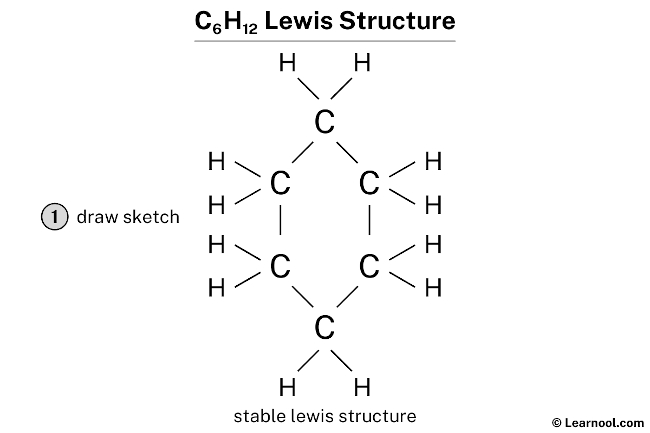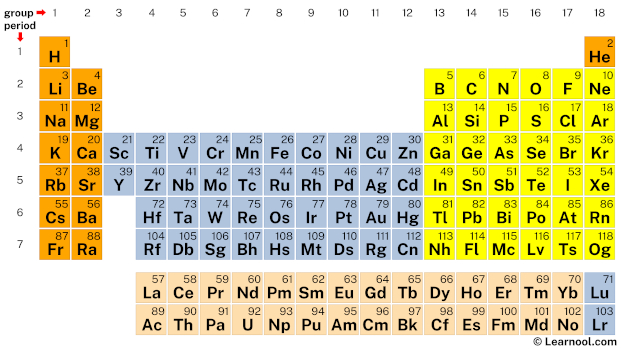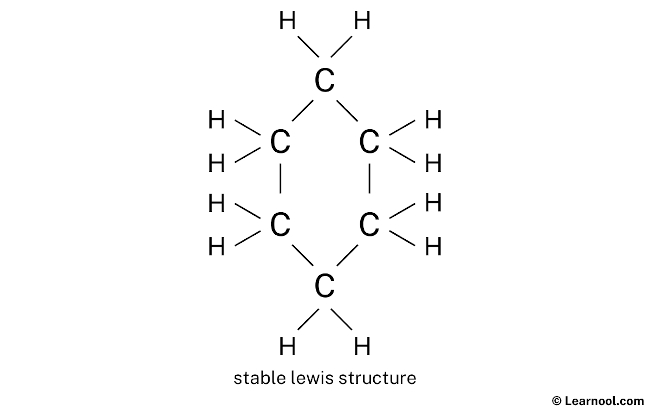
C6H12 (cyclohexane) has six carbon atoms and twelve hydrogen atoms.
In the C6H12 Lewis structure, there are six single bonds between the six carbon atoms, and each carbon is attached with two hydrogen atoms. And none of the atoms has a lone pair.
Alternative method: Lewis structure of C6H12
Steps
Here’s how you can easily draw the C6H12 Lewis structure step by step:
#1 Draw a rough skeleton structure
#2 Mention lone pairs on the atoms
#3 If needed, mention formal charges on the atoms
Now, let’s take a closer look at each step mentioned above.
#1 Draw a rough skeleton structure
- First, determine the total number of valence electrons

In the periodic table, carbon lies in group 14, and hydrogen lies in group 1.
Hence, carbon has four valence electrons and hydrogen has one valence electron.
Since C6H12 has six carbon atoms and twelve hydrogen atoms, so…
Valence electrons of six carbon atoms = 4 × 6 = 24
Valence electrons of twelve hydrogen atoms = 1 × 12 = 12
And the total valence electrons = 24 + 12 = 36
Learn how to find: Carbon valence electrons and Hydrogen valence electrons
- Second, find the total electron pairs
We have a total of 36 valence electrons. And when we divide this value by two, we get the value of total electron pairs.
Total electron pairs = total valence electrons ÷ 2
So the total electron pairs = 36 ÷ 2 = 18
- Third, determine the central atom
Here hydrogen can not be the central atom. Because the central atom is bonded with at least two other atoms, and hydrogen has only one electron in its last shell, so it can not make more than one bond.
Now there are six atoms remaining and all six atoms are carbon, so we can assume any one as the central atom.
Let’s assume that the central atom is top carbon.
Therefore, place carbons in the center and hydrogens on either side.
- And finally, draw the rough sketch

#2 Mention lone pairs on the atoms
Here, we have a total of 18 electron pairs. And eighteen bonds are already marked. So we do not have to mark any electron pair as a lone pair on the sketch.
In the above structure, you can see that the central atom (top carbon) forms an octet. The outside atoms (other carbons) also form an octet, and all hydrogens form a duet. Hence, the octet rule and duet rule are satisfied.
Therefore, this structure is the stable Lewis structure of C6H12.
Next: H3PO3 Lewis structure
External video
- C6H12 Lewis Structure: How to Draw the Lewis Structure for Cyclohexane – YouTube • Wayne Breslyn
External links
Deep
Learnool.com was founded by Deep Rana, who is a mechanical engineer by profession and a blogger by passion. He has a good conceptual knowledge on different educational topics and he provides the same on this website. He loves to learn something new everyday and believes that the best utilization of free time is developing a new skill.
